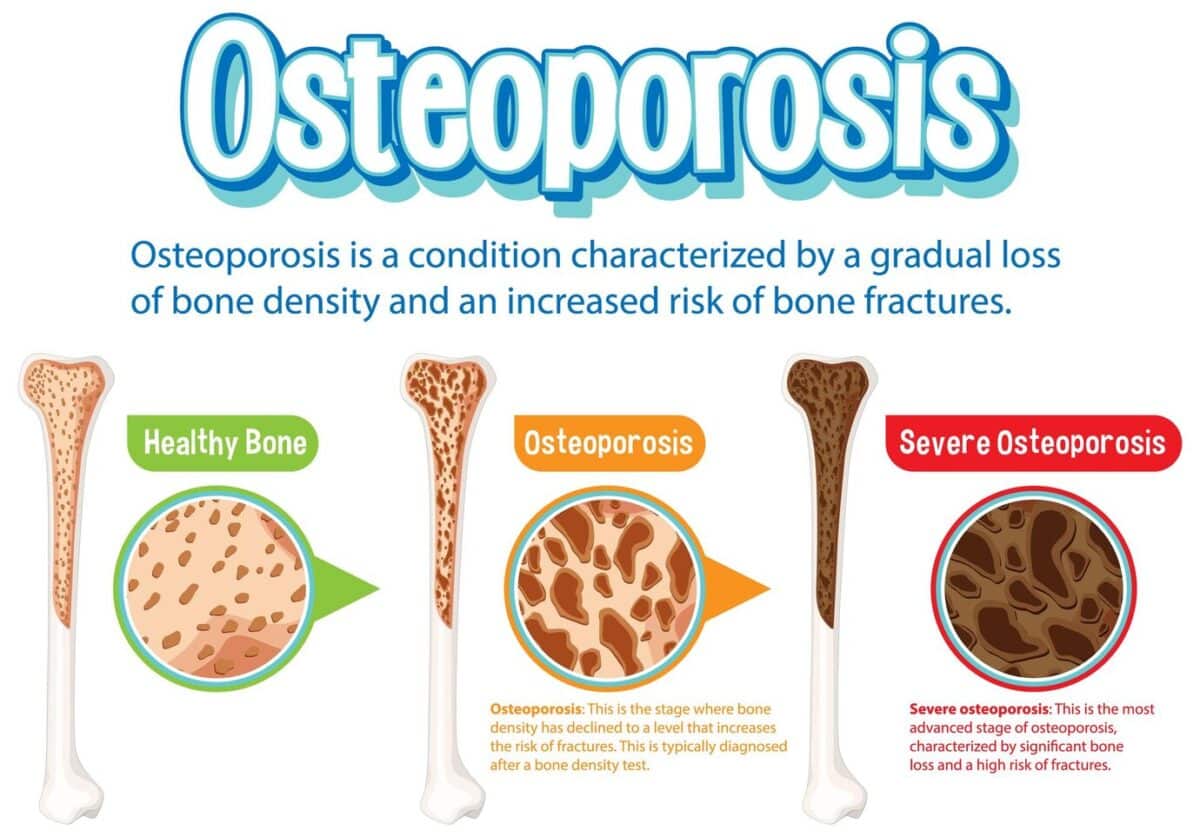As you age, you may wonder if osteoporosis could be the culprit behind your hip pain. You’re not alone – osteoporosis affects approximately 10 million Americans over the age of 50, and it’s more common in women. But can osteoporosis cause hip pain? The answer is yes, and understanding the connection between osteoporosis and hip pain is crucial for seniors like you who want to maintain their independence and mobility. This article by Oceanview Senior Living will investigate the relationship between osteoporosis and hip pain, exploring the signs, symptoms, risk factors, diagnosis, and treatment options. By the end of this article, you’ll better understand how osteoporosis can impact your hip health and how you can manage your symptoms.
The Prevalence of Osteoporosis in Seniors
Before we probe the connection between osteoporosis and hip pain, it’s imperative to understand the scope of osteoporosis among seniors. As you age, your risk of developing osteoporosis increases, making it a significant concern for seniors.
Statistics on Osteoporosis in Seniors
With approximately 10 million Americans over the age of 50 affected by osteoporosis, it’s a widespread issue that demands attention. Women are more likely to be affected, with nearly 20% of women and 5% of men experiencing osteoporosis. These numbers highlight the importance of understanding osteoporosis and its impact on daily life.
The Impact of Osteoporosis on Daily Life
One of the most significant consequences of osteoporosis is its ability to limit daily activities and independence. As bones weaken, even simple tasks like walking or bending can become challenging, leading to a decline in overall quality of life.
A decline in bone density can also lead to a loss of confidence, making you more hesitant to engage in activities you once enjoyed. This can result in social isolation, depression, and a sense of vulnerability. Furthermore, the fear of falling or fracturing a bone can create anxiety, making it difficult to perform everyday tasks. By understanding the impact of osteoporosis on daily life, you can take proactive steps to manage your condition and maintain your independence.

Osteoporosis on Daily Life
Age-related Osteoporosis
There’s a common misconception that osteoporosis is an inevitable part of aging, but understanding the disease can help you take control of your bone health. Age-related osteoporosis, also known as primary osteoporosis, is the most common type of osteoporosis, and it affects millions of seniors worldwide.
Definition and Explanation of Age-related Osteoporosis
Elucidation of age-related osteoporosis reveals a complex process where your body’s natural bone remodeling process is disrupted, leading to an imbalance between bone resorption and formation. As you age, your body’s ability to replace old bone tissue with new bone tissue slows down, resulting in a net loss of bone mass and density.
How it Affects Bone Density and Structure
The effects of age-related osteoporosis on bone density and structure are multifaceted. As your bones lose density, they become more porous and fragile, making them prone to fractures. The trabecular bone, the spongy tissue inside your bones, is particularly affected, leading to decreased bone strength and an increased risk of hip fractures.
The definition of age-related osteoporosis highlights the importance of understanding the underlying mechanisms contributing to bone loss. As you age, your body’s production of hormones, such as estrogen and testosterone, decreases, increasing the production of cytokines, which stimulate bone resorption. This, combined with reduced physical activity and a diet lacking imperative nutrients, creates a perfect storm for bone loss. By understanding these factors, you can take proactive steps to prevent or manage age-related osteoporosis and reduce your risk of hip pain and fractures.
Transient Osteoporosis
It is essential to understand that osteoporosis is not just one condition; different forms of osteoporosis can affect your hips. According to the Mayo Clinic, “Osteoporosis—Symptoms and Causes” can lead to hip pain. One such form is transient osteoporosis, a rare condition that causes temporary bone loss in the upper part of your thighbone (femur).
Definition and explanation of transient osteoporosis
The term “transient” means temporary, and this form of osteoporosis is characterized by a sudden onset of bone loss in the hip, which can cause pain and weakness. Unlike age-related osteoporosis, transient osteoporosis is not related to aging or menopause.
Differences from age-related osteoporosis
The definition of transient osteoporosis highlights its distinct nature compared to age-related osteoporosis. While age-related osteoporosis is a gradual process that occurs over time, transient osteoporosis develops suddenly and temporarily.
Plus, unlike age-related osteoporosis, which affects multiple bones throughout the body, transient osteoporosis primarily affects the hip joint. Additionally, the symptoms of transient osteoporosis tend to resolve on their own within 6-12 months. In contrast, age-related osteoporosis is a chronic condition that requires ongoing management.
Does Osteoporosis Cause Hip Pain?
Not surprisingly, osteoporosis can indeed cause hip pain, particularly in seniors. According to the Mayo Clinic, “Hip fracture – Symptoms & causes,” hip fractures are a common consequence of osteoporosis, leading to pain, limited mobility, and decreased quality of life.
The Link Between Osteoporosis and Hip Pain
Understanding the relationship between osteoporosis and hip pain is crucial in managing this condition. Osteoporosis weakens bones, making them more susceptible to fractures, which can lead to hip pain.
How Osteoporosis Leads to Hip Pain
Painful hip fractures are a common consequence of osteoporosis. When your bones weaken, they become more prone to breaks, which can occur even with minor falls or twists.
Plus, bone weakening can lead to micro-fractures, which can cause chronic pain and discomfort. Furthermore, the resulting inflammation and swelling can exacerbate the pain, making it difficult to perform everyday activities.
Signs and Symptoms: Recognizing Hip Pain from Osteoporosis
Many seniors experience hip pain, but it’s crucial to recognize whether it’s related to osteoporosis or another underlying condition. Understanding the signs and symptoms of hip pain from osteoporosis can help you seek timely medical attention and prevent further complications.

Signs and Symptoms
Common symptoms of hip pain from osteoporosis
With osteoporosis, you may experience a range of symptoms, including pain at rest, swelling and bruising, limited range of motion, and sudden pain that worsens with weight-bearing activities. These symptoms can significantly impact your daily activities and overall well-being.
Red flags to watch out for
Osteoporosis can lead to severe consequences if left untreated. Be cautious of red flags such as sudden, severe pain, difficulty walking, or limited mobility, as these may indicate a hip fracture or other serious complications.
Symptoms that persist or worsen over time, such as gradual worsening of pain, limited range of motion, or difficulty performing daily activities, should prompt you to consult your doctor. Early diagnosis and treatment can significantly improve your outcomes and prevent further bone loss.
Other Possible Causes of Hip Pain Not Related to Osteoporosis
To ensure an accurate diagnosis, it’s vital to consider other potential causes of hip pain unrelated to osteoporosis. While osteoporosis can significantly contribute to hip pain, other conditions can cause similar symptoms.
Alternative explanations for hip pain
Hip pain can be related to joint inflammation. Osteoarthritis, rheumatoid arthritis, and other inflammatory joint conditions can cause it. Bursitis, tendinitis, and muscle or ligament sprains can also contribute to hip pain.
Importance of accurate diagnosis
Hip pain can have multiple underlying causes, making an accurate diagnosis crucial for effective treatment. Ruling out other potential causes of hip pain helps your doctor develop a personalized treatment plan tailored to your needs.
Understanding the underlying cause of your hip pain is vital in determining the best course of treatment. Considering all possible causes, your doctor can develop a comprehensive plan to alleviate your pain, prevent further complications, and improve your overall bone health.
Are You at Risk for Hip Pain from Osteoporosis?
Once again, understanding the risk factors for osteoporosis can help you and your doctor work together to reduce your risk. Some risk factors are modifiable, but it is impossible to avoid others.
Factors that increase the risk of hip pain from osteoporosis
Individuals with specific characteristics may be more prone to developing osteoporosis and experiencing hip pain. These factors include:
- Being a woman, especially those who have undergone menopause
- Having a family history of osteoporosis or hip fractures
- Aging, as bone loss happens more quickly with age
- Having a low body weight puts you at higher risk due to less bone mass
- Lack of physical activity and weight-bearing exercise
- Inadequate calcium and vitamin D intake
- Chronic heavy alcohol use or smoking
- Certain medications, such as glucocorticoids, that can cause bone loss
- This list is not exhaustive, and it’s essential to consult your doctor to determine your specific risk factors.
Lifestyle changes to reduce the risk
Risk reduction starts with making conscious lifestyle choices. Incorporating these changes can lower your chances of developing osteoporosis and experiencing hip pain.
To reduce your risk, focus on maintaining a healthy diet rich in calcium and vitamin D, engaging in regular weight-bearing exercises, and quitting smoking. Additionally, limiting alcohol consumption and managing your medications can also help mitigate the risk of osteoporosis. Taking proactive steps can safeguard your bone health and minimize the likelihood of hip pain.
Diagnosing Hip Pain from Osteoporosis
Your doctor will use a combination of medical history, physical examination, and diagnostic imaging tests to diagnose hip pain caused by osteoporosis accurately.
Medical history and physical examination
A vital part of diagnosing hip pain from osteoporosis is understanding your medical history, including any previous injuries or conditions that may be contributing to your symptoms. Your doctor will ask you questions about your risk factors for osteoporosis, such as your age, family history, and lifestyle habits. A physical examination will also assess your range of motion and identify any signs of osteoporosis, such as limited mobility or swelling.
Imaging tests and diagnostic tools
Medical imaging tests are crucial in diagnosing hip pain from osteoporosis. These tests can help your doctor visualize your bones and detect any signs of bone loss, fractures, or other abnormalities. Standard imaging tests used to diagnose osteoporosis include X-rays, bone density scans (DEXA scans), and magnetic resonance imaging (MRI).
This is especially important in diagnosing transient osteoporosis, where an MRI can detect bone marrow edema, a common finding in this condition. Additionally, blood tests may be done to assess your calcium and vitamin D levels and other markers related to your bone health. While these tests can’t diagnose osteoporosis, they can provide valuable insights into bone health and rule out other causes of hip pain.
Treatment of Hip Pain from Osteoporosis
Unlike other conditions, treating hip pain caused by osteoporosis requires a multifaceted approach that addresses not only the pain but also the underlying bone loss and weakness. Your healthcare provider will work with you to develop a personalized treatment plan that combines lifestyle modifications, physical therapy, and medications to alleviate pain, prevent further fractures, and enhance your overall bone health.
Medications and pharmaceutical interventions
With the guidance of your healthcare provider, medications can play a crucial role in managing hip pain from osteoporosis. Non-steroidal anti-inflammatory (NSAID) medications can help relieve pain and inflammation. At the same time, bisphosphonates can slow bone loss and improve bone density, reducing the risk of fractures.
Non-pharmacological treatments and therapies
Focusing on promoting bone health and preventing further fractures, non-pharmacological treatments, and therapies can be highly effective in managing hip pain from osteoporosis. These may include restrictions on weight-bearing activities, using walking aids, simple at-home exercises or physical therapy, and calcium and vitamin D supplements.
Pain management is a critical aspect of treating hip pain from osteoporosis. Your healthcare provider may recommend a combination of physical therapy, exercise, and lifestyle modifications to help manage pain and improve mobility. For example, water exercises can be an excellent way to relieve weight-bearing stress on the hip while maintaining strength and flexibility. Additionally, a customized exercise program can help you maintain mobility and reduce the risk of falls. By working with your healthcare provider, you can develop a comprehensive treatment plan that addresses your unique needs and helps you manage hip pain from osteoporosis.
Managing Hip Pain from Osteoporosis
For individuals with osteoporosis, managing hip pain is crucial to maintaining their quality of life. Effective management involves a combination of lifestyle modifications, alternative therapies, and medical interventions tailored to the individual’s specific needs.

Managing Hip Pain from Osteoporosis
Lifestyle modifications for pain management
Managing your daily activities to reduce hip stress can help alleviate pain. This may involve modifying your daily routine, such as taking regular breaks to rest, using assistive devices like canes or walkers, and engaging in low-impact exercises like swimming or cycling.
Alternative therapies and complementary approaches
To complement traditional medical treatments, alternative therapies like acupuncture, massage, and yoga can help manage hip pain and improve overall well-being. These approaches can also help reduce stress and anxiety, which can exacerbate pain.
Understanding the benefits of alternative therapies is vital in developing a comprehensive pain management plan. For instance, acupuncture can stimulate the release of natural pain-relieving chemicals. Massage can also improve circulation and reduce muscle tension.
Conversely, yoga can help improve flexibility and balance, reducing the risk of falls and fractures. By incorporating these alternative approaches into your treatment plan, you can experience enhanced pain relief and overall health.
Preventing Hip Fractures from Osteoporosis
Keep in mind that preventing hip fractures from osteoporosis requires a multifaceted approach. Taking proactive steps can reduce your risk of fractures and maintain your independence.
Strategies for fall prevention
Falls are a significant concern for seniors, as they can lead to hip fractures. To prevent falls, remove tripping hazards from your home, install handrails in critical areas, and improve lighting. Additionally, exercise regularly to improve balance and strength.
Exercises and physical therapy for strengthening bones
Therapy-focused exercises can help strengthen your bones and reduce your risk of fractures. Work with a physical therapist to develop a customized exercise program that targets your hips, spine, and wrists.
Fractures can be devastating, but exercise and physical therapy can prevent them. By incorporating weight-bearing exercises, such as walking or jogging, into your routine, you can strengthen your bones and reduce your risk of fractures. Exercises that improve balance and flexibility, such as tai chi or yoga, can also help prevent falls. Remember to consult with your healthcare provider before starting any new exercise program.
Living with Hip Pain from Osteoporosis
Now that you’ve been diagnosed with osteoporosis, it’s imperative to understand how to manage your hip pain and maintain your quality of life. Living with hip pain can be challenging, but with the proper coping mechanisms, emotional support, and strategies to maintain independence, you can learn to adapt and thrive.
Coping mechanisms and emotional support
On top of the physical challenges, living with hip pain from osteoporosis can take a toll on your mental and emotional well-being. It’s crucial to develop coping mechanisms to deal with the frustration, anxiety, and depression that may come with chronic pain. Seek emotional support from family, friends, or support groups to help you stay positive and motivated.
Maintaining independence and daily function
Daily activities may become more challenging with hip pain. However, it’s imperative to maintain your independence and daily function as much as possible. Simple grocery shopping, cooking, or showering may require adjustments. However, with the right strategies, you can continue to live a fulfilling life.
With the help of physical therapy, occupational therapy, or home health care, you can learn new ways to perform daily tasks that minimize strain on your hips. For example, you may need to use assistive devices like canes or walkers to reduce pressure on your hips while walking or standing. Modifying your home, such as installing handrails or non-slip mats, can help prevent falls and reduce the risk of further injury.
The Future of Osteoporosis Treatment and Research
All advancements in osteoporosis research and treatment are focused on improving diagnosis, prevention, and management of the disease, ultimately enhancing the quality of life for individuals like you who are affected by it.
Emerging trends and advancements
Innovative approaches, such as gene therapy, stem cell therapy, and nanotechnology, which promise more effective and targeted therapies, are expected to provide future breakthroughs in osteoporosis treatment.
Hope for improved treatments and outcomes
Emerging research on osteoporosis brings new hope for improved treatments and outcomes, particularly in personalized medicine and early intervention.
The development of more targeted and effective therapies is expected to significantly improve osteoporosis treatment outcomes, enabling individuals like you to manage their condition better and reduce the risk of fractures and related complications. As researchers uncover the underlying mechanisms of osteoporosis, new opportunities for prevention and treatment will emerge, offering a brighter future for those affected by the disease.
Final Words
Following this comprehensive guide, you now better understand how osteoporosis can cause hip pain in seniors. Remember, it’s necessary to recognize the signs and symptoms of osteoporosis, especially if you’re at risk due to age, family history, or other factors. By taking proactive steps, such as incorporating exercise into your daily routine, maintaining a healthy diet, and consulting with your doctor, you can reduce your risk of hip fractures and alleviate hip pain. If you’re experiencing hip pain, don’t hesitate to seek medical attention. Learn more about Does Osteoporosis Cause Hip Pain with Exercise? and take control of your bone health today. At Oceanview Senior Living in Newport, OR, we’re committed to providing seniors with the support and resources they need to maintain their overall well-being. Call us at 541-574-0550 to learn more about our senior living community.



































